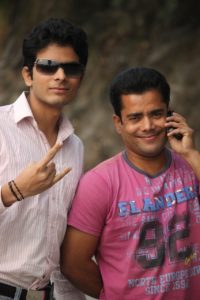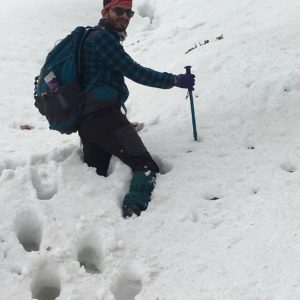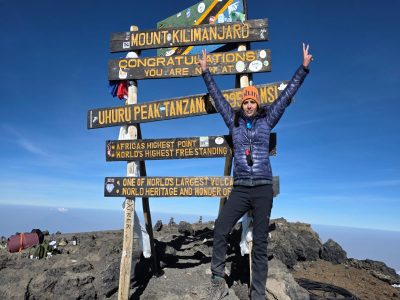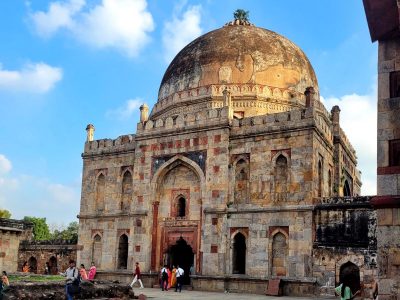Bedridden after a life-threatening car accident—with an injured spine— inspired Vikram Jeet Singh Parmar to conquer the highest peaks of the world. His story is an inspiration for all
“Difficulty is what wakes up the genius” wrote Nassim Nicholas Taleb in his famous book Antifragile: Things That Gain from Disorder. A good example is Vikram Jeet Singh Parmar, a resident of a small town Kichha in Uttarakhand. He will turn 30 this year in December.
Six years ago in a road crash, Vikram ended up breaking 4 ribs, c2, c6 and c7 in the spinal cord, bones in his legs were shattered, leaving the left leg unresponsive. His mortal situation prompted a doctor friend to retort ‘How the hell are you alive.’ A four-hour-long-operation at Medanta-Medicity saved his life. A screw holds his neck together and he’s mighty lucky not to be a quadriplegic.
Within a year of the accident, Vikram accomplished a superhuman feat—he went for a trek in the snow-clad mountains 5000m above sea level. This is how he did it.
A master in computer application, Vikram does odd projects for Facebook and other such organisations, he is also an avid, as he describes, an ‘Acrophobic Mountain Tourist.’ A bit of a paradox, but the bigger paradox is him calling the life threatening car accident—that was actually a life-transforming experience—as “the best thing that has ever happened to me.”
The transformation happened when he lay flat on the bed, with his neck braced to keep his head still, staring at the roof for three long months. He spent time reading—reading some 40 books—and playing Rubik’s cube—has gained a fair bit of facility in solving 3×3, 4×4 and 6×6 versions of Rubik’s cube.

This long phase of inactivity was harbouring seeds of transformation—upheaval inside. His condition was also a learning experience. He was grateful to be alive and to appreciate the small innocuous activities that may seem commonplace but integral to life, like swallowing of food, as one of the greatest gifts of the Almighty.
Lying on the bed, Vikram recollects, his “mind was at some other place.” His only worry was who would take care of his mother. Vikram’s father died when he was ten years old, and his elder sister is married. He loves a small-town life, staying in the house built by his father with the comforting presence of his mother. His house has a big courtyard in the front where he relearned walking with the help of his childhood friend, Sayed Mujahid Ali, two years older than him, is now his brother from another mother.
Mujahid stayed with him during the surgery, and would visit him daily to attend to his daily needs during the phase he was bedridden. While bedridden, amongst the many books he read, Ed Viesturs’s No Shortcuts to the Top had a profound impact on him. “Lying in the bed….while reading I’d imagine myself doing what was described in the book and promised that I will get up, get fit and chase my dream.” Also, he was enacting and reenacting, in his mind, his childhood dream to climb Mount Everest.
Within a year of his debilitating accident, he had already done a trek 5200m above the sea level in the Himalayas. “Being on top of three 6000m (high) mountains, I am here today because of your writings,” Vikram wrote to Ed Viesturs. Prompt was Viesturs’s response, “I feel very honoured that my book and stories helped you to recover. I get many emails from readers and yours is truly one of the most remarkable. Keep climbing! You are a rock star.”
Vikram kept climbing and is truly a rock star—a debilitating situation that kept him bedridden for a long time inspired him to climb, scale the highest peaks of the world. It’s his ardent desire to climb the highest peaks of the world in the years to come. And that’s not a big challenge given what he’s already endured and became stronger in the process.
His climbing mentor is Kuntal A Joisher is a 41 years old Mumbaikar and a Software Engineer by profession. He is the first Indian vegan mountaineer to have scaled Mt. Everest twice. They have been companions to many arduous treks in the frozen reaches of the Himalayas. He, like Vikram, wants to conquer one of the most dangerous peaks—his personal mission. And it’s not a surprise that the two are close friends—Kuntal was trapped at the Base Camp of Mt. Everest when a devastating avalanche was triggered by an Earthquake in April, 2015. This near-death experience triggered in him a storm of emotions that would change his entire life—not very different from what a life-threatening accident did to Vikram.

During his slow phase of recovery, Vikram had texted Kuntal, his dream to scale snowy peaks. Kuntal was quick to respond on the lines, “You’re in bed, immobile, talking about climbing Mt. Everest….I don’t have the confidence you have..I need your confidence to climb Mt Everest,” recollects Vikram. A feat that was achieved by Kuntal twice—both from the northern and southern side.
Vikram has to take special care like he tries not to make any jerky movement of his neck, is forbidden from driving a car, and taking a bike ride. He takes care of himself by keeping him climbing fit. His room has a workstation on one side and a personal gymnasium on the other, walls are lined with bookshelves. He’s curious to know about new things, new ways to challenge himself while pursuing his passion.
This year he plans to summit Mt. Kilimanjaro in Africa and Mt. Elbrus in Europe as part of “Phase 1 of my dream project—to climb the seven summits.” Also, he wants to know about the highest place on the planet where a Rubik’s cube has been solved—no one for sure has done it sitting atop Mount Everest.
His website displays a powerful sentence by Albert Camus below a picture of him standing tall in the top reaches of snow-clad mountains: “The only way to deal with an unfree world is to become so absolutely free that your very existence is an act of rebellion.”





